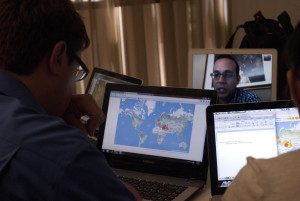Undergraduate Minor
 Humanities studies the big questions about human culture and society. Digital Humanities applies digital tools to the study of these big questions. With the Digital Humanities (DH) Minor, you’ll learn about how technology is shaping the world, and you’ll also get hands-on experience with digital tools to explore humanities questions. We value project-based learning, and our students often work in teams. Launched in 2011, the DH Minor currently enrolls about 150 undergraduates from many different majors. Some people start the minor with a lot of technical skills, and some people start with none. We meet you where you are, and we help you to grow from there. Everyone’s welcome!
Humanities studies the big questions about human culture and society. Digital Humanities applies digital tools to the study of these big questions. With the Digital Humanities (DH) Minor, you’ll learn about how technology is shaping the world, and you’ll also get hands-on experience with digital tools to explore humanities questions. We value project-based learning, and our students often work in teams. Launched in 2011, the DH Minor currently enrolls about 150 undergraduates from many different majors. Some people start the minor with a lot of technical skills, and some people start with none. We meet you where you are, and we help you to grow from there. Everyone’s welcome!
Application:
We accept applications all year. We will read applications by October 25 and April 1. Notifications will be emailed to applicants by November 1 and April 15.
Apply NowRequirements
- One lower-division elective, selected from our list of approved electives.
- DH 101: Introduction to DH101 (offered Fall, Winter, Spring, and Summer)
- One upper division course selected from DH 110-160 (check out the Courses Page for details)
- Four upper-division electives, selected from DH courses and/or our list of approved courses.
How To Find Electives
- Review the master list of approved electives. Note: “Grad” denotes graduate courses, “LD” denotes lower division, and “UD” denotes upper division courses.
- Identify courses you’re interested in.
- Check the course schedule to see if the courses of interest are offered in the next quarter.
- Register!
Learning Outcomes:
- Critically evaluate data, information systems, and data structures, as well as primary and secondary sources
- Apply both quantitative and qualitative methods to analyze data
- Employ computational methods to answer humanistic questions, and employ humanistic interpretive methods and critiques to engage with computation
- Conceptualize and execute independent and collaborative digital research projects
- Collaborate effectively with team members, including those in different disciplines
- Communicate data analysis clearly to both specialist and non-specialist audiences
- Apply basic principles of accessibility and user experience design to the creation of a digital project
- Learn current, in-demand technologies, skills, tools, and scripting languages to be better equipped for the 21st century workplace
- Use, critique, and build basic digital infrastructures, such as databases and archives, for Humanities disciplines
The learning outcomes for the DH program address each of the core competencies: critical thinking, information literacy, quantitative reasoning, written communication, and oral communication. Critical thinking and information literacy run throughout the program: Digital tools, algorithms, and data are never simply “givens” but rather subject to intense scrutiny: Who made them? For what ends? How are they structured? What assumptions govern how they work? In more advanced courses, students “look under the hood” and begin to modify data and tools (using, for example, APIs and open source software). Thorough documentation – in the form of project briefs, data critiques, project write-ups, and final websites – accompanies all research and learning. The capstone projects are the culmination of this process and evidence the ability to use both quantitative and qualitative methods of analysis. Capstones are project-based collaborations and require students to publicly present their projects orally at the end of the year.
What Does a DH Project Look Like?
A lot of different things! We’re proud of our students’ work, which includes:
- multimedia narratives on the Eastern State Penitentiary, K-town cuisine, and New Jersey shipwrecks
- online exhibits about drone warfare and the evolution of pop music
- an exploration of holocaust testimonials through data visualization and topic modeling
- an analysis of social media data about big events
What Does a DH Class Look Like?
You can see some of our course websites here:
- DH101: Introduction to Digital Humanities (Summer 2021)
- DH 150: Social Media Data Analytics (2019)
- DH 125: Data Analysis for Social and Cultural Research (2021)
What Do DH Minors Go on to Do?
We’re still learning! Since the DH minor is new, we’re taking notes as our students enter the workforce. Recent graduates are:
- helping Oracle build databases
- coordinating UCLA’s social media campaigns
- entering the library profession
- working for museums
- practicing law
- learning about information design in grad school
… and many other things, too!
Read more about the panelists’ backgrounds and skip to content of interest on our blog post!
Contact
You’re always welcome to get in touch. You can also check out our frequently asked questions.
Email: Deanna Finlay (SAO)
Please email SAO Deanna Finlay if you need a form signed or to schedule an advising meeting.

